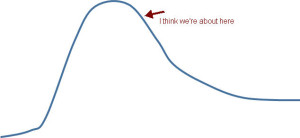I’m going to go out on a limb here and say that I believe indie publishing has peaked.
I write science fiction, and science fiction writers always trying to predict trends. And like any science fiction writer I can get it horribly wrong, but I do think that indie publishing has peaked.
At GenreCon last year I noticed that everyone, but everyone, seemed to be pushing the indie-pub option. If you look at conference schedules for the various genres this year every one of them has at least one session devoted to the subject. Many have more. Even San Diego Comic Con had a session.
Even so, I am starting to see a trend away from the enthusiastic, “Forget about traditional publishers, indie is the only way to go,” back to a more measured assessment of whether alternate publishing models work.
I can understand that, because self-publishing isn’t the nirvana everyone wants it to be. From my perspective as both a reader and a writer there’s a lot that doesn’t work for me with the indie publishing model.
As a reader
I used to buy and read a lot of indie author work. I don’t any more. It’s too hard to trawl through the badly-formatted, poorly written stuff to get to the gems. (I shop like that too. I hate sales, with those tables of sale items you have to sift through to find the bargains. I can’t be bothered.)
I used to follow a number of authors whose writing I liked and who showed promise, but their writing never improved, so in the end I gave up on them.
I still occasionally chance on new self-pubbed authors but nowadays most of those I read are authors I liked through traditional publishing who later moved on to publishing for themselves.
It seems to me too that the indie-published authors I do read are finding it hard. I read their blogs and they say it’s a lot of work. A couple have already transitioned back to traditional publishing for some of their work.
As a writer
Self-publishing is hard work. Not only do you have to write the book, you have to edit it (or better yet, organise editors—pay them, even), arrange covers, market it on your own, be your own technical person and so on. In short, you have to be the author, editor, marketing person, sales person, and everything else your agent and publisher do. Me, I just want to write books. That’s enough work on its own.
Plus, don’t discount the value of the work your agent and editor do for you. Our first book improved out of sight after our agent suggested revisions. It improved again after our editor got out her electronic red pen.
There’s also the issue of money. There is no real competitor for Amazon in self-publishing. I can see that the commission they pay on self-published books won’t stay high forever, especially if they win the Hachette-Amazon dispute.
My prediction
My gut feel is that indie publishing will follow a traditional bacterial growth curve, with logarithmic growth—as we have seen in the last few years—followed by a decline until it settles down to a stable position.

I don’t think it will go away. It has a place, and will be accepted alongside traditional publishing as a viable publishing option.
I do think, however, that the glory days of indie publishing are past us.